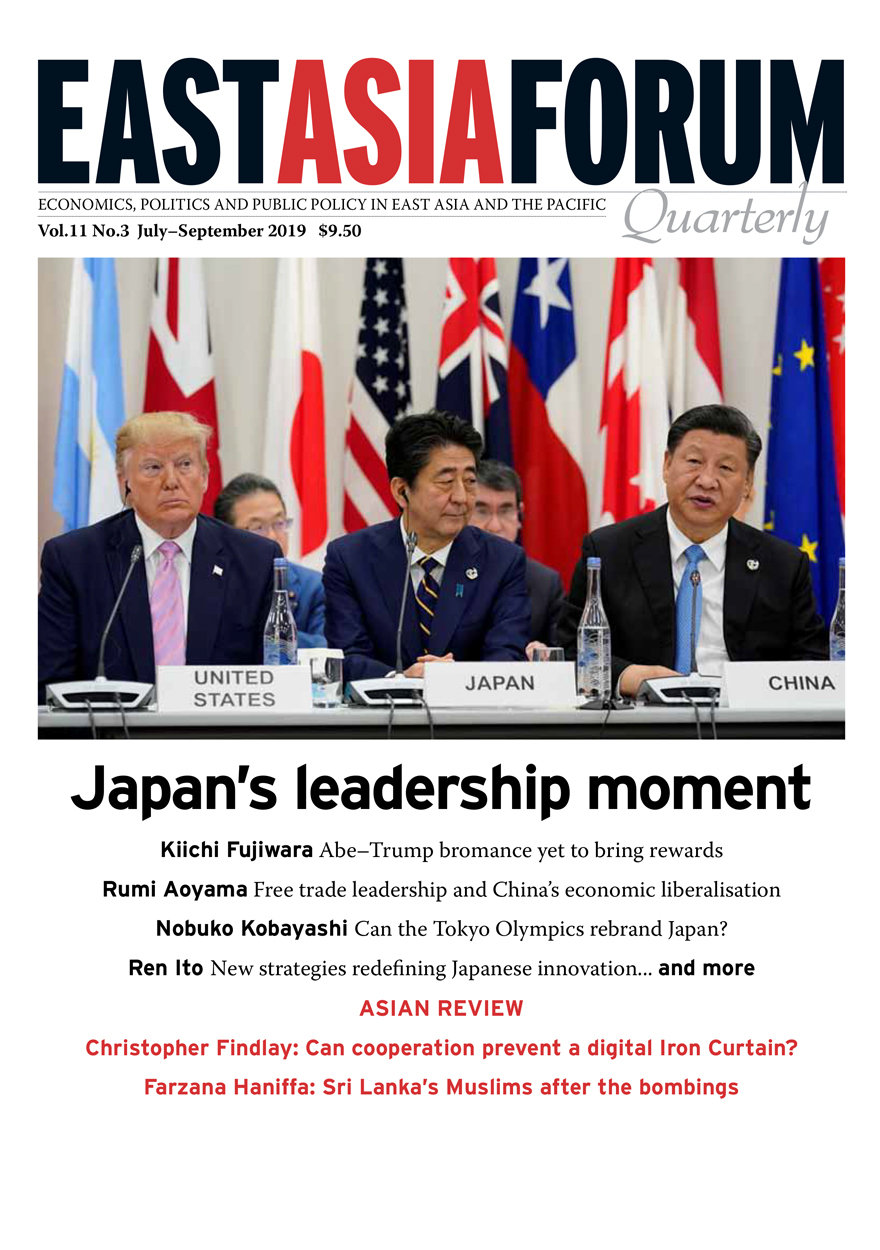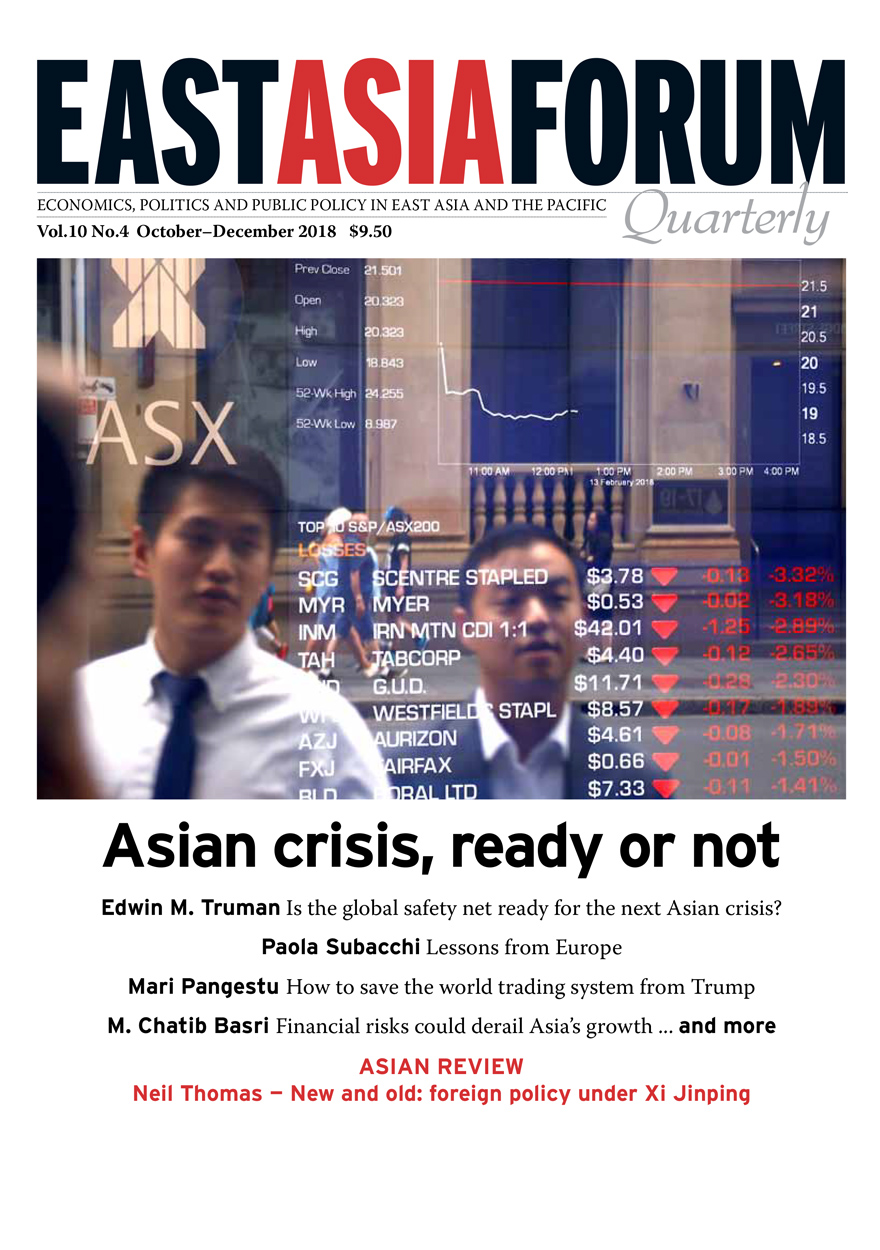Search titles
Displaying results 11 to 20 of 69.

Learning from Fukushima (Japanese version) »
Nuclear power in East Asia
Edited by: Peter Van Ness, Mel Gurtov
Publication date: March 2020
東アジアの原子力に未来はあるかーー福島の原発事故を受け開催された、原子力エネルギーをめぐる二つの重要な国際会議の成果。ノーベル平和賞ICAN創設者をはじめとする核問題の専門家が内外から参加。各国の原子力政策、原発推進の真のコスト、ポスト原子力の未来等、東アジアにおける原子力の現状と課題を浮き彫りにする。オーストラリア国立大学出版局との共同出版。

East Asia Forum Quarterly: Volume 11, Number 4, 2019 »
Publication date: November 2019
The idea that countries can pursue prosperity and security as separate streams of the national interest has passed. Economics and security have always been enmeshed, although we assumed otherwise. The nature of the relationship between the two is changing fast. The narratives that surround the change find it difficult to keep up with the facts.
The world has become more multipolar, with remarkable growth outside the established powers in the North Atlantic. And big countries—not just the United States and China, but other G20 members like Brazil, Turkey, Russia and the United Kingdom—have become more nationalist and brazen in asserting what they perceive to be their economic and security interests over those of others. The US–China relationship is increasingly characterised by strategic competition in both the economic and security domains.
At the same time, digital technology has not just transformed products, firms and markets, it has opened them to cyber disruption and attack, resulting in a cross-over of security into the economic and social domains.
This issue of the East Asia Forum Quarterly explores what is happening, why and how to respond to the change. These essays argue for careful thought and active engagement by governments, business and the broader community. Genuine dialogue and problem-solving between the economic and security parts of universities and government is a good first step to frame the problem broadly, keep perspective and find solutions.
East Asia Forum Quarterly grew out of East Asia Forum (EAF) online, which has developed a reputation for providing a platform for the best in Asian analysis, research and policy comment on the Asia Pacific region in world affairs. EAFQ aims to provide a further window onto research in the leading research institutes in Asia, and to provide expert comment on current developments within the region. East Asia Forum Quarterly, like East Asia Forum online, is an initiative of the East Asia Forum and its host organisation, the East Asian Bureau of Economic Research in the Crawford School of Economics and Government in the College of Asia & the Pacific at The Australian National University.
Download for free
Not available for purchase

East Asia Forum Quarterly: Volume 11, Number 3, 2019 »
Publication date: August 2019
When Shinzo Abe was given a second chance at the Japanese prime ministership in 2012, Japan was in the throes of a period of intense domestic turmoil. After six prime ministers in six years, the nation was in desperate need of political stability. Abe has not only delivered that but is now set to become the longest-serving prime minister in modern Japanese history.
Abe commenced his second term with an ambitious policy program focused on reinvigorating the nation’s stagnant economy, amending the constitution to achieve a more ‘normal’ defence and security policy, and engaging proactively in regional and global affairs.
To what extent has Abe achieved these policy goals? How has he utilised the immense political capital accrued throughout his leadership tenure? And what will be the legacy that Abe leaves when his prime ministership ultimately comes to an end? In this issue of East Asia Forum Quarterly, scholars from both inside and outside Japan grapple with these questions.
East Asia Forum Quarterly grew out of East Asia Forum (EAF) online, which has developed a reputation for providing a platform for the best in Asian analysis, research and policy comment on the Asia Pacific region in world affairs. EAFQ aims to provide a further window onto research in the leading research institutes in Asia and to provide expert comment on current developments within the region. The East Asia Forum Quarterly, like East Asia Forum online, is an initiative of the East Asia Forum (EAF) and its host organisation, the East Asian Bureau of Economic Research (EABER) in the Crawford School of Economics and Government in the College of Asia & the Pacific at The Australian National University.
Download for free
Not available for purchase

East Asia Forum Quarterly: Volume 11, Number 1, 2019 »
Publication date: March 2019
This issue of East Asia Forum Quarterly touches on key economic and social questions that affect gender equality in Southeast Asia and East Asia, delving beneath the aggregates and measurement challenges. Strengthening the evidence base is critical to building the policy toolkit and shaping public investments that ensure no woman or man is left behind.
East Asia Forum Quarterly grew out of East Asia Forum (EAF) online, which has developed a reputation for providing a platform for the best in Asian analysis, research and policy comment on the Asia Pacific region in world affairs. EAFQ aims to provide a further window onto research in the leading research institutes in Asia and to provide expert comment on current developments within the region. The East Asia Forum Quarterly, like East Asia Forum online, is an initiative of the East Asia Forum (EAF) and its host organisation, the East Asian Bureau of Economic Research (EABER) in the Crawford School of Economics and Government in the College of Asia & the Pacific at The Australian National University.
Download for free
Not available for purchase

Pacific Exposures »
Photography and the Australia–Japan Relationship
Authored by: Melissa Miles, Robin Gerster
Publication date: December 2018
Photography has been a key means by which Australians have sought to define their relationships with Japan. From the fascination with all things Japanese in the late nineteenth century, through the era of ‘White Australia’, the bitter enmity of the Pacific War, the path to reconciliation in the post-war period and the culturally complicated bilateralism of today, Australians have used their cameras to express a divided sense of conflict and kinship with a country that has by turns fascinated and infuriated. The remarkable photographs collected and discussed here for the first time shed new light on the history of Australia’s engagement with its most important regional partner. Pacific Exposures argues that photographs tell an important story of cultural production, response and reaction—not only about how Australians have pictured Japan over the decades, but how they see their own place in the Asia-Pacific.
‘Pacific Exposures presents the first study of the photographic exchanges between Australia and Japan—its photographers, personalities, motivations, anxieties and tensions—based on a diverse range of archival materials, interviews, and well-chosen photographs.’
— Dr Luke Gartlan, University of St Andrews
‘[Pacific Exposures] will become a key text on Australia’s interactions with Japan, and the way that photographs can inform cross-cultural relations through their production, consumption and circulation.’
— Prof. Kate Darian-Smith, University of Tasmania
In the media
Listen to the ABC Radio interview: Japan in Focus (from 13:06).

Indigenous Efflorescence »
Beyond Revitalisation in Sapmi and Ainu Mosir
Publication date: December 2018
Indigenous efflorescence refers to the surprising economic prosperity, demographic increase and cultural renaissance currently found amongst many Indigenous communities around the world. This book moves beyond a more familiar focus on ‘revitalisation’ to situate these developments within their broader political and economic contexts. The materials in this volume also examine the everyday practices and subjectivities of Indigenous efflorescence and how these exist in tension with ongoing colonisation of Indigenous lands, and the destabilising impacts of global neoliberal capitalism. Contributions to this volume include both research articles and shorter case studies, and are drawn from amongst the Ainu and Sami (Saami/Sámi) peoples (in Ainu Mosir in northern Japan, and Sapmi in northern Europe, respectively). This volume will be of use to scholars working on contemporary Indigenous issues, as well as to Indigenous peoples engaged in linguistic and cultural revitalisation, and other aspects of Indigenous efflorescence.

East Asia Forum Quarterly: Volume 10, Number 4, 2018 »
Publication date: October 2018
East Asia Forum Quarterly grew out of East Asia Forum (EAF) online, which has developed a reputation for providing a platform for the best in Asian analysis, research and policy comment on the Asia Pacific region in world affairs. EAFQ aims to provide a further window onto research in the leading research institutes in Asia and to provide expert comment on current developments within the region. The East Asia Forum Quarterly, like East Asia Forum online, is an initiative of the East Asia Forum (EAF) and its host organisation, the East Asian Bureau of Economic Research (EABER) in the Crawford School of Economics and Government in the College of Asia & the Pacific at The Australian National University.
Download for free
Not available for purchase

East Asia Forum Quarterly: Volume 10, Number 3, 2018 »
Publication date: August 2018
East Asia Forum Quarterly has grown out of East Asia Forum (EAF) online which over the past year has developed a reputation for providing a platform for the best in Asian analysis, research and policy comment on the Asia Pacific region in world affairs. EAFQ aims to provide a further window onto research in the leading research institutes in Asia and to provide expert comment on current developments within the region. The East Asia Forum Quarterly, like East Asia Forum online, is an initiative of the East Asia Forum (EAF) and its host organisation, the East Asian Bureau of Economic Research (EABER) in the Crawford School of Economics and Government in the College of Asia and the Pacific at The Australian National University.
Download for free
Not available for purchase

East Asia Forum Quarterly: Volume 10, Number 2, 2018 »
Publication date: June 2018
East Asia Forum Quarterly grew out of East Asia Forum (EAF) online, which has developed a reputation for providing a platform for the best in Asian analysis, research and policy comment on the Asia Pacific region in world affairs. EAFQ aims to provide a further window onto research in the leading research institutes in Asia and to provide expert comment on current developments within the region. The East Asia Forum Quarterly, like East Asia Forum online, is an initiative of the East Asia Forum (EAF) and its host organisation, the East Asian Bureau of Economic Research (EABER) in the Crawford School of Economics and Government in the College of Asia & the Pacific at The Australian National University.
Download for free
Not available for purchase

Asian Economic Integration in an Era of Global Uncertainty »
Edited by: Shiro Armstrong, Tom Westland
Publication date: January 2018
The Pacific Trade and Development (PAFTAD) conference series has been at the forefront of analysing challenges facing the economies of East Asia and the Pacific since its first meeting in Tokyo in January 1968.
The 38th PAFTAD conference met at a key time to consider international economic integration. Earlier in the year, the people of the United Kingdom voted to leave the European Union and the United States elected Donald Trump as their next president on the back of an inward-looking ‘America First’ promise. Brexit and President Trump represent a growing, and worrying, trend towards protectionism in the North Atlantic countries that have led the process of globalisation since the end of the Second World War.
The chapters in the volume describe the state of play in Asian economic integration but, more importantly, look forward to the region’s future, and the role it might play in defending the global system that has underwritten its historic rise. Asia has the potential to stand as a bulwark against the dual threats of North Atlantic protectionism and slowing trade growth, but collective leadership will be needed regionally and difficult domestic reforms will be required in each country.



